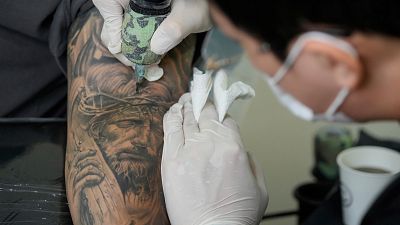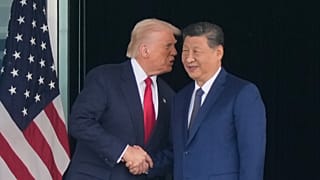South Korea
Tattoos have long been stigmatised in South Korea. Starting over a thousand years ago, people’s crimes or slave status was inked on their face or arms.
In the 20th century, they were adopted by criminal gangs.
But despite the fact that they were socially taboo and that for more than 30 years, being a tattoo artist was a punishable offense, the art has flourished underground.
Under a 1992 Supreme Court ruling, getting a tattoo was considered a medical procedure that could only be performed by a doctor.
Recent government estimates put the number of tattoo artist at around 350,000, most of whom did not have a medical licence and were therefore practicing illegally.
Last month, Seoul legalised tattoos by non-medical professionals for the first time following a campaign by artists.
In recent a documentary, “Angels”, filmmaker Hicham Touili-Idrissi and producer Nancy-Wangue Musisá, paint a portrait of the tattooists who defied stigma and the law to follow their passion.
"I try to be confident and have nothing to hide - that's my personality. Thinking about my life and future, my biggest problem is instability," said tattoo artist Gui Hee in the film.
They said their tattoos and work exposed them to disapproval in Korean society, including from their own families.
It is a stigma that persists today.
Fellow artist, Héin,said sometimes being tattooed frustrated her.
“I lived with my grandmother when I was younger, and when I walked by, older people would look at me. They would look at me and see the tattoo on my face and start to worry,” she said.
With the passing of the Tattooist Act, non-medical professionals – who make up most of the industry - will be able to obtain a licence to operate in the open.
But hurdles remain. The new law will only take effect in two years, and artists will have to pass a national exam, complete safety and hygiene training, and keep detailed records.
Changing public attitudes to tattoos in South Korea will likely take longer.














Go to video
Guinea: African Union lifts sanctions
01:00
Prime Minister Takaichi and President Lee share drum session in Tokyo
01:14
UK sanctions four senior RSF commanders over atrocities in Sudan
02:19
Turkey: archaeologists uncover ancient Jesus fresco in tomb
01:09
EU sanctions Sudan RSF leader over war crimes
Go to video
EU sanctions top Sudan paramilitary chief over Darfur abuses